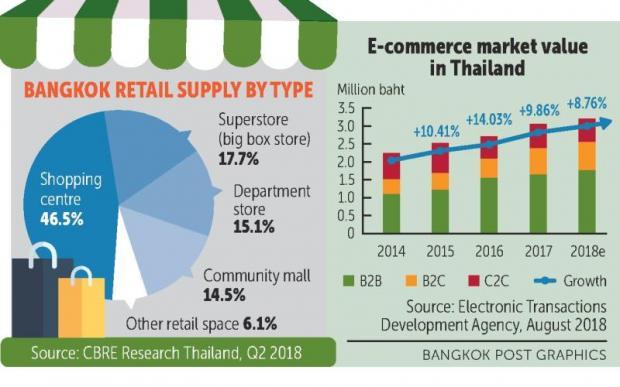Thailand: 30 years of change in the local retail market
Retail property is one of the most complicated types of real estate development because of the constantly changing tastes and needs of consumers.
The Thai retail property market has changed hugely over the last 30 years since the property services firm CBRE established its office in Bangkok, and change is continuing at an even faster rate, especially with the growth of e-commerce.
30 years ago, CBRE notes, the Bangkok retail property market was limited to a handful of department stores and a few shopping centres. The latter included CentralPlaza Ladprao, completed in 1982, Amarin Plaza (1985) and the original Siam Centre completed in 1973. The rest of the retail sector was shophouses and wet markets.
CBRE Research shows that there is now almost 7.5 million square metres of modern retail property in Bangkok, split between shopping centres at 46.5%, big-box stores (17.7%), department stores (15.1%), community malls (14.5%) and other formats (6.1%). There has been rapid growth and change not only in the range of retail formats but also types of tenants.
“Over the last 30 years, we have seen an increased move from traditional retail in wet markets and shophouses to modern retail formats ranging from convenience stores and community malls to giant regional shopping centres such as CentralPlaza Westgate,” CBRE said.
The modern retail format has spread throughout the country with many provincial cities now having modern shopping centres.
The first 7-Eleven convenience store opened in the country in 1989 and the chain now has 10,268 outlets. The first big-box store was Makro Ladprao in Bang Kapi district in 1989 and now Big C, Tesco Lotus and Makro have over 450 large-format stores in Thailand.
The Thai retail market, like its counterparts in the rest of the world, is facing the new challenge of e-commerce. E-commerce is expected to account for 18% of total retail sales in the UK this year and 9.5% in the United States. The figure in Thailand is less than 1% but is expected to grow rapidly as e-commerce platforms and infrastructure, including payment systems and distribution, are now well established.
“Retailers will have to adapt to best serve customers in stores and online. Retail developers will have to improve the customer experience through design, decoration, events, tenant mix and customer service,” said CBRE.
Retail landlords will have to create a unique environment that cannot be replicated online, for example by setting aside space for pop-up stores and sharing data with retail tenants to improve marketing.
Clicks will not totally replace bricks but it’s clear that retailers and retail property developers will have to change, advises Jariya Thumtrongkitkul, head of advisory and transaction services (retail) at CBRE Thailand.
“Simply building a nice glass box and filling it with brand names, will not work anymore,” she said. “Many retailers are trying to pursue an omni-channel approach with both online and offline channels that are fully integrated whereby the digital and physical options complement each other.”
The continuous change in consumer behaviour means that retail property development is much more complicated than office development. It requires hands-on management and constant innovation and improvement. Landlords need to speak to both consumers and tenants daily to understand rapidly changing trends and requirements.
The level of commitment and expertise needed is very high and unlike hotels, it is rare to subcontract management of a retail space to a third party in Thailand.
Even though the economy is improving, retailers, retail landlords and developers face big challenges in adapting to the changing environment caused by e-commerce.
“The shopping centre is one of the most successful business models and will not fade away, but competition from e-commerce means that the model will have to evolve to survive,” concluded Ms Jariya.
Source: https://www.bangkokpost.com/business/news/1525634/30-years-of-change-in-the-local-retail-market


 English
English




